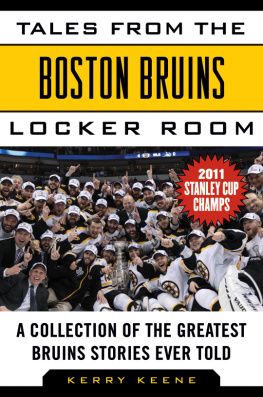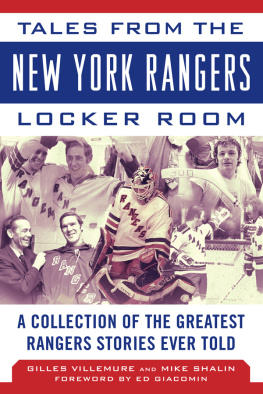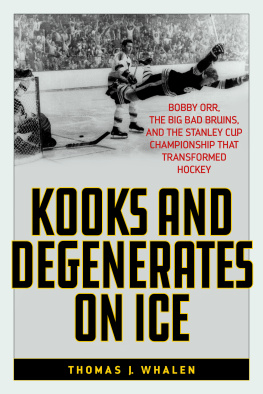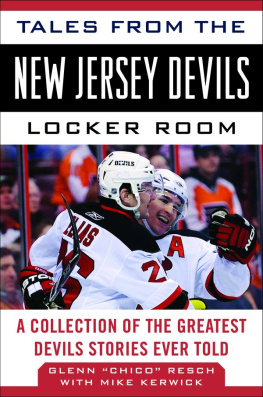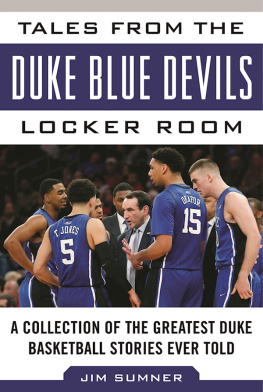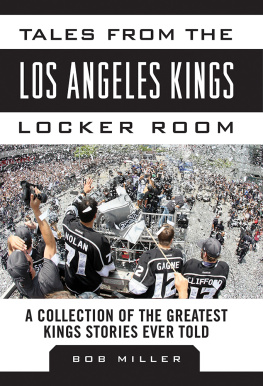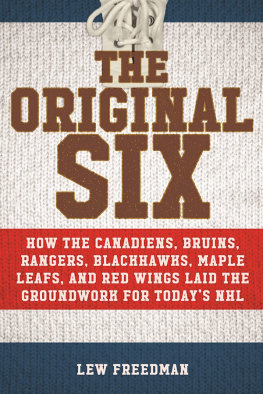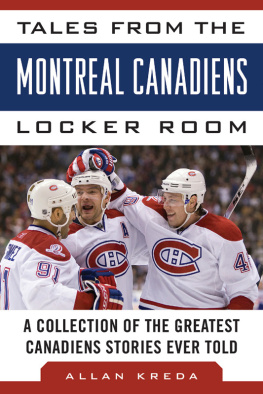TALES FROM THE
BOSTON BRUINS
LOCKER ROOM
TALES FROM THE
BOSTON BRUINS
LOCKER ROOM
A COLLECTION OF THE GREATEST BRUINS STORIES EVER TOLD
KERRY KEENE

Copyright 2003, 2011 by Kerry Keene
All Rights Reserved. No part of this book may be reproduced in any manner without the express written consent of the publisher, except in the case of brief excerpts in critical reviews or articles. All inquiries should be addressed to Sports Publishing, 307 West 36th Street, 11th Floor, New York, NY 10018.
Sports Publishing books may be purchased in bulk at special discounts for sales promotion, corporate gifts, fund-raising, or educational purposes. Special editions can also be created to specifications. For details, contact the Special Sales Department, Sports Publishing, 307 West 36th Street, 11th Floor, New York, NY 10018 or .
Sports Publishing is a registered trademark of Skyhorse Publishing, Inc., a Delaware corporation.
www.skyhorsepublishing.com
10 9 8 7 6 5 4 3 2 1
Library of Congress Cataloging-in-Publication Data is available on file.
ISBN: 978-1-61321-058-1
Printed in the United States of America
ACKNOWLEDGMENTS
I n keeping with a hockey theme, assists must be credited to Steve Babineau, Peter Curry, Fred Cusick, David Flebotte, Dick Johnson of the Sports Museum of New England, Rene Rancourt, Dick Sarkisian of the Sports Tradition in West Bridgewater, Massachusetts, and Bob Sweeney and Mal Viola of the Boston Bruins Alumni Association.
Nominees for my Most Valuable Player go to David Hickey, Harvey McKenney, and Kevin Vautour.
CONTENTS
PREFACE:
THE LONG AWAITED
REUNION WITH LORD
STANLEYS CUP
O ften, there is a more compelling story of the journey than of the arrival.
On June 15, 2011, the Boston Bruins, rising to the heights of their capabilities and perhaps a bit beyond, shifted many painful memories and bitter disappointments to a less prominent place in the minds of a legion of followers. But at that precise moment, it was nearly impossible not to look back to a simpler time when the thought of such an expedition seemed far less daunting.
The scene fades to New Yorks Madison Square Garden, May 11, 1972. The Bruins skate around the ice with the Stanley Cupthe second time they have captured the coveted trophy in three years. With figures such as Bobby Orr and Phil Esposito solidly in their prime and an outstanding supporting cast around them, it was reasonable to assume that this scene would be repeated a few more times as the decade unfolded.
Entering the Stanley Cup Finals in June, 2011, no lifelong Bruins fan under the age of forty-two could possibly possess a personal, firsthand memory of the team winning the elusive prize, or the subsequent victory parade through the streets of Boston.
But even as that parade was rolling in the spring of 72 celebrating the beloved Bruins, the landscape of professional hockey was in the process of being altered forever. Not only was the National Hockey League set to add two new teamsthe New York Islanders and the Atlanta Flamesthe World Hockey Association was set to begin its inaugural season in the fall, with twelve new teams poised to compete directly with the NHL for both players and fans.
As the Bruins were set to open the 1972-73 season to defend their Stanley Cup championship, they would be doing so without key players such as goaltender Gerry Cheevers, who signed with Cleveland of the WHA; Derek Sanderson, who signed a lavish deal with the new circuits Philadelphia team; Ted Green and Johnny McKenzie jumped to the leagues nearby New England Whalers; and Eddie Westfall, who was lost to the Islanders in the expansion draft. The team that the entire Boston area had fallen head over heels for the previous few seasons had lost several of its key components and would never again be able to replicate the success of 1972. The Bruins franchise would continue to retain its extraordinarily loyal fan base, but for the next few decades, they would live in the formidable shadow of those Stanley Cup winners from the early 1970s. They possessed a unique blend of sheer talent and a cast of true characters that had proven to be virtually impossible to duplicate.
Reprising even one of those unforgettable Stanley Cup victories over these many years has proven to be as elusive as the fabled unicorn, the pot of gold at the end of the rainbow, or Captain Ahabs white whale.
Eleven months after hoisting the Cup in 72 at Madison Square Garden, the Bruins were unceremoniously eliminated from the playoffs in the first round in six games by those same Rangers. The recently departed Bruins stars had taken a bit of the teams magic with them.
The next season the Bruins bounced back and celebrated the franchises 50th season with a better performance in 73-74 and managed to get back to the Stanley Cup Finals. They were beaten, however, by the upstart Philadelphia Flyers in six games. Led by center Bobby Clarke and goaltender Bernie Parent, the Broad Street Bullies also won the following seasons Stanley Cup. With that Cup victory in 1975, the Flyers had won as many in their eight-season existence as Boston had won in the previous thirty-three years.
The Bruins were clearly one of the elite teams in the NHL in the decade of the 1970s, finishing either first or second in their division every season. But by 1977, the nucleus of the team was dramatically different from the Stanley Cup winning teams from earlier in the decade. Though Cheevers had returned to the team in early 76 and Johnny Bucyk and Wayne Cashman remained, gone were Orr, Esposito, Ken Hodge, Fred Stanfield, Eddie Johnston, and Don Awrey. In their places were Brad Park, Jean Ratelle, Peter McNab, Rick Middleton, and Mike Milbury, with the popular and outspoken Don Cherry behind the bench.
In May of 77 Boston advanced to the Stanley Cup Finals, but had the unenviable task of facing a Montreal team that was not only the defending Cup champion but who had won sixty games in the regular season while losing only eight. The series was over quickly as the juggernaut Canadiens swept the Bruins in four straight games.
The two teams had a return engagement in the finals the following spring, 1978. The Canadiens were only slightly less dominant that season, winning 59 and losing 10. After losing the first two games in Montreal, the Bruins managed to tie the Series with wins in Games 3 and 4 back at the Boston Garden. But Montreal came back with wins in Games 5 and 6 to capture the third of what would be four straight Cups for the Canadiens.
But it was Bostons exit from the playoffs in the spring of 1979 that Boston Red Sox fans might relate to as the Bruins Bucky Dent or Bill Buckner moment.
Ahead by one goal in Game 7 with two-and-a-half minutes to go in the Conference Finals against their old nemesis, Montreal, fate would intervene in a cruel way.
At that moment, a penalty was called on Boston for too many men on the ice. The call elicits a collective groan to this day from every Bruins fan who observed it. Despite a gallant effort, the Bruins could not hang on to kill off the penalty. With less than a minute and a half remaining in regulation time, the Canadiens star right-winger, Guy Lafleur, put a slapshot past Bruins goaltender Gilles Gilbert. Nearly ten minutes into overtime, Canadiens left-winger Yvan Lamberts goal helped Montreal send the Bruins home empty-handed for the third straight year. Compounding the anguish for Bruins fans was the realization that had Boston hung on to win Game 7 to advance to the Finals, they would have met a New York Rangers team that many felt was inferior to the Bruins. Boston had finished the regular season with nine more points than New York, and had beaten the Rangers in three of their five meetings. Montreal went on to dispatch New York in five games to win their fourth straight Stanley Cup. Bruins fans were left to ponder what if...

